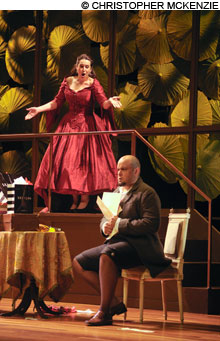
DISAPPOINTING DON This production of Donizetti’s comic masterpiece was often better heard than seen. |
This year's Boston Midsummer Opera (at the Tsai Center through July 29) is Donizetti's very late (the 64th of his 66 operas) Don Pasquale, a musically inspired and humanly endearing bel canto comedy about the indiscretion of old age and the cruelty of youth. And artistic director/conductor Susan Davenny Wyner knows exactly how to make it breathe, make it sparkle, and make it sing. Seconds into the overture, which includes some of the best music in the opera, we could hear the fizz of the busy-music and the sighing and soaring love music. Wyner never for a moment let Donizetti down. There was one odd compromise: the magical cornet solo accompanying the tenor's lament is so haunting because the sound and color of a cornet ought to go against the grain of the subject. Here we got Jennifer Slowik's fine English horn, but without Donizetti's special charm. I guess good cornet players are hard to come by. The reduced orchestra at BU's Tsai Center met Wyner's challenges. If you closed your eyes, the production was utterly engaging.And if you opened them at the right moments, you would also have been in luck. This was only the second opera staged by the delightful and touching actor and accomplished theater director Austin Pendleton. His heart was certainly in the right place. In this hoary commedia dell'arte plot about a rich old bachelor who refuses to allow his nephew to marry the girl he loves but decides in his advanced years to get married himself, Pendleton Lysol'd away most of the stock gestures — the exaggerated double takes and artificial poses of most productions.
Here's the plot: to disabuse Don P of his fantasy about having a young wife, the delectable but poor Norina, the inamorata of Don P's nephew Ernesto, and the wily Dr. Malatesta, contrive to marry the old man off to Malatesta's young and innocent sister, right out of the convent — but it's really Norina herself whose initial naiveté turns suddenly shrewish and greedy. When Pasquale forbids her to go to the theater, she slaps him. That slap should reverberate as a crushing assault. And Pendleton got it to work. He also got a lot mileage out of Don Pasquale's teddy bear — a touching image of both his foolishness and his desire to have a child.
But while the music kept percolating, Pendleton didn't come up with enough witty and imaginative things for the singers to do to replace the abandoned clichés. Too often, they just stood or sat around, without much point.
The look of the production didn't offer much help. Pendeleton was stuck with Stephen Dobay's shockingly drab set (Fifty Shades of Brown?), and Charles Schoonmaker's incoherent costumes (18th-century wigs, ruffles, blue jeans, and high heels!). In the final garden scene, the back of the stage was filled with green umbrellas. I don't know what they were doing there, but at least they injected a welcome note of color far better suited to Donizetti's tonal rainbow.